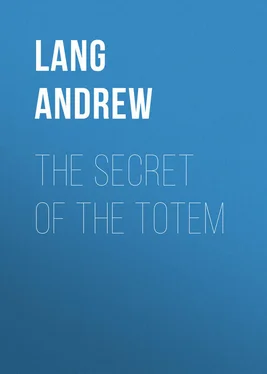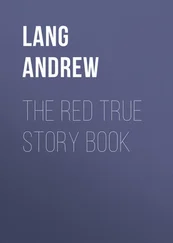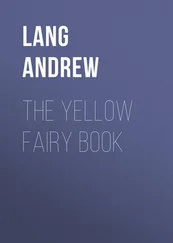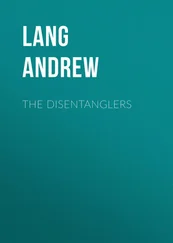Andrew Lang - The Secret of the Totem
Здесь есть возможность читать онлайн «Andrew Lang - The Secret of the Totem» — ознакомительный отрывок электронной книги совершенно бесплатно, а после прочтения отрывка купить полную версию. В некоторых случаях можно слушать аудио, скачать через торрент в формате fb2 и присутствует краткое содержание. Жанр: foreign_antique, foreign_prose, на английском языке. Описание произведения, (предисловие) а так же отзывы посетителей доступны на портале библиотеки ЛибКат.
- Название:The Secret of the Totem
- Автор:
- Жанр:
- Год:неизвестен
- ISBN:нет данных
- Рейтинг книги:4 / 5. Голосов: 1
-
Избранное:Добавить в избранное
- Отзывы:
-
Ваша оценка:
- 80
- 1
- 2
- 3
- 4
- 5
The Secret of the Totem: краткое содержание, описание и аннотация
Предлагаем к чтению аннотацию, описание, краткое содержание или предисловие (зависит от того, что написал сам автор книги «The Secret of the Totem»). Если вы не нашли необходимую информацию о книге — напишите в комментариях, мы постараемся отыскать её.
The Secret of the Totem — читать онлайн ознакомительный отрывок
Ниже представлен текст книги, разбитый по страницам. Система сохранения места последней прочитанной страницы, позволяет с удобством читать онлайн бесплатно книгу «The Secret of the Totem», без необходимости каждый раз заново искать на чём Вы остановились. Поставьте закладку, и сможете в любой момент перейти на страницу, на которой закончили чтение.
Интервал:
Закладка:
Thus the tribal names may result from an expanded use of earlier names of blood relationship, or names of tribal status may now be applied to include persons who are within degrees of blood relationship. In the latter case, how do we know that a tribe with its degrees of status is primitive? Starcke thinks that Mr. Morgan's use of terms of relationship as proof of "communal marriage" is "a wild dream, if not the delirium of fever." "The nomenclature was in every respect the faithful reflection of the juridical relations which arose between the nearest kinsfolk of each tribe. Individuals who were, according to the legal point of view, on the same level with the speaker, received the same designation. The other categories of kinship were formally developed out of this standpoint." The system of names for relationships "affords no warrant" for Mr. Morgan's theory of primitive promiscuity. 39 39 Starcke, The Primitive Family , p. 207.
Similar arguments against inferring collective marriage in the past from existing tribal terms of relationship are urged by Dr. Durkheim. 40 40 L'Année Sociologique , i. pp. 313-316.
He writes, taking an American case of names of relationship, as against Professor Kohler: "We see that the (Choctaw) word Inoha (mother) applies indifferently to all the women of my mother's group, from the oldest to the youngest. The term thus defines its own meaning: it applies to all the women of the family (or clan?) into which my father has married. Doubtless it is rather hard to understand how the same term can apply to so many different people. But certain it is, that the word cannot awake, in men's minds, any idea of descent , in the usual sense of the word. For a man cannot seriously regard his second cousin as his mother, even virtual. The vocabulary of relationships must therefore express something other than relations of consanguinity, properly so-called… Relationship and consanguinity are very different things … relationship being essentially constituted by certain legal and moral obligations, which society imposes on certain individuals." 41 41 L'Année Sociologique , i. p. 315.
The whole passage should be read, but its sense is that which I have already tried to express; and Dr. Durkheim says, "The hypothesis of collective marriage has never been more than an ultima ratio " (a last resource), "intended to enable us to envisage these strange customs; but it is impossible to overlook all the difficulties which it raises."
An analogous explanation of the wide use of certain terms of relationship has been given by Dr. Fison, of whom Mr. Howitt writes, "Much of what I have done is equally his." 42 42 Native Tribes of South-East Australia , xiv.
Dr. Fison says, "All men of the same generation who bear the same totem are tribally brothers, though they may belong to different and widely separated tribes. Here we find an explanation of certain apparently anomalous terms of relationship. Thus, in some tribes the paternal grandson and his grandfather call one another 'elder brother' and 'younger brother' respectively. These persons are of the same totem." 43 43 Can Dr. Fison mean of the same matrimonial class?
"Many other designations" in Mr. Morgan's Tables of Terms of Relationship "admit of a similar solution." 44 44 Kamilaroi and Kurnai , pp. 166, 167.
The terms do not denote degrees of blood relationship, but of brotherhood in the totem (or phratry, or matrimonial class). It is so, too, with the Choctaw term for Mother. Every one knows who his mother, in our sense, is: the Choctaw term denotes a tribal status.
If it be said that, because a man calls his wife his Noa , and also calls all women whom he might have married his Noa , therefore all these women, in past times, would have been his wives; it might as well be said that all the women whom he calls "mother" would, in times past, have collaborated in giving birth to him. As far as these terms indicate relationship, "a man is the younger brother of his maternal grandmother," and the maternal grandfather of his second cousin! 45 45 Native Races of South-East Australia , p. 163. Pointed out by Mr. N. W. Thomas.
The terms do not denote relationship in blood, clearly, but something quite different.
The custom of Piraungaru , or Pirrauru , and cases of license at festivals, and the names for tribal relations, are, we repeat, the only arguments in favour of the theory of the communal horde. 46 46 The participation of many men in the jus primae noctis is open to various explanations.
We have shown that the terms of relationship do not necessarily help the theory. That theory, again, is invalidated by its inability to account for the origin of the rules forbidding marriage between persons of the same phratry (for it does not tell us why the original medicine man conceived the idea of regulations), or even to account for the origin of the phratriac divisions.
But why, on our system, can the Piraungaru custom break the rule of individual marriage more easily than the law prohibiting incest? Why it can do so on the theory of pristine promiscuity we have explained (p. 41, supra ).
We reply that individual marriage has not, among savages, any "religious" sanction; it is protected by no form of the phratry or totem tabu; by no god, such as Hymen; but rests, as from the first it rested, on the character and strength of the possessor of the woman or women, and falls into abeyance if he does not choose to exert it. If the males of the Urabunna have so far departed from the natural animal instincts as usually (with exceptions) to prefer to relax their tenure of women, being tempted by the bribe of a legalised change of partners all round, they exhibit, not a primitive, but a rather advanced type of human nature. The moral poet sings: —
"Of Whist or Cribbage mark the amusing Game,
The Partners changing, but the Sport the same,
Then see one Man with one unceasing Wife,
Play the long Rubber of connubial Life." 47 47 Poetry of the Antijacobin.
This is the "platform" of the Urabunna and Dieri, as it is of the old Cicisbeism in Italy, and of a section of modern "smart society," especially at the end of the ancien régime in France. Man may fall into this way of thinking, just as, in Greece, he actually legalised unnatural passions by a ceremony of union. "That one practice, in many countries, became systematised," as Mr. J. F. McLennan wrote to Mr. Darwin. 48 48 Studies in Ancient History , ii. p. 52.
This is not the only example of a legalised aberration from nature, or from second nature. Abhorrence of incest has become a law of second nature, among savage as among civilised men. But Dr. Durkheim publishes a long list of legalised aberrations from the laws of incest among Hebrews, Arabs, Phœnicians, Greeks, Slavonic peoples, Medes, Persians, Egyptians, Cambodians, and Peruvians. 49 49 L'Année Sociologique , i., pp.38, 39, 62.
If these things, these monstrous aberrations, can be legalised "in the green tree," why should not jealousy fall into a kind of legalised abeyance among the Urabunna, under the law of partner-shifting? The Piraungaru custom does not prove that earliest man was not ferociously jealous; it merely shows that certain tribes have reached a stage in which jealousy is, at present, more or less suppressed in favour of legalised license.
We catch the Urabunna and Dieri at a moment of development in which the abandonment of strict possession of a wife is compensated for by a legalised system of changing partners, enduring after the feast of license is over. But even so, a man is responsible, as father, for the children of his actual wife, not for the children of his Piraungaru paramours. For these their actual husbands ( Tippa Malku ) are responsible.
Читать дальшеИнтервал:
Закладка:
Похожие книги на «The Secret of the Totem»
Представляем Вашему вниманию похожие книги на «The Secret of the Totem» списком для выбора. Мы отобрали схожую по названию и смыслу литературу в надежде предоставить читателям больше вариантов отыскать новые, интересные, ещё непрочитанные произведения.
Обсуждение, отзывы о книге «The Secret of the Totem» и просто собственные мнения читателей. Оставьте ваши комментарии, напишите, что Вы думаете о произведении, его смысле или главных героях. Укажите что конкретно понравилось, а что нет, и почему Вы так считаете.












